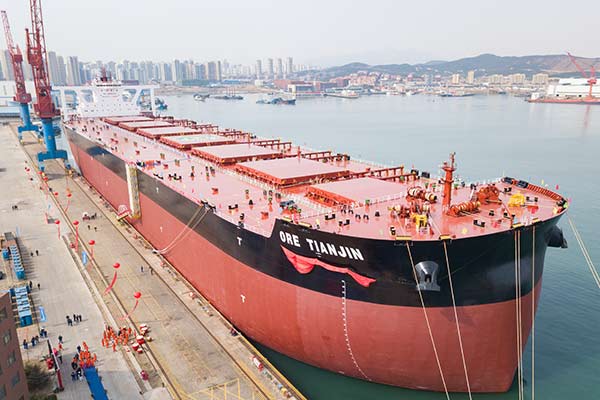Shandong shipbuilder delivers huge ore carrier


Shandong-based Qingdao Beihai Shipbuilding Heavy Industry Co, a subsidiary of Wuchang Shipbuilding Industry Group Co, delivered a very large ore carrier, or VLOC, to its client on Thursday.
The ship, named Ore Tianjin, has 400,000 metric tons' carrying capacity and is the first VLOC the group has made for Industrial and Commercial Bank of China Leasing. Aiming to reduce the shipping cost by increasing capacity and enhance the operator's global competitive edge, the ship has a loading capacity equivalent to 6,666 regular freight train cabins.
It is designed for Brazilian miner Vale SA to conduct tasks on the route between China and Brazil, the company said in a statement.
Qingdao Beihai Shipbuilding will deliver a total of eight VLOCs of this kind to different clients within the year.
"The bulk carrier can sail at a speed of 27 kilometers per hour for 25,550 nautical miles nonstop. It means the ship can sail between any two ports in the world without extra fueling," the company said.
Compared to other VLOCs, the carrier can consume 18.8 percent less energy, by having an extra tank for liquefied gas as fuel. It makes the carrier more environment-friendly, as the liquefied gas produces 30 percent less nitrogen oxides and 15 percent less carbon dioxides than the usual fuel.
The ship is 362 meters in length, 65 meters in breadth and 30.4 meters in height. It weighs 54,200 tons.
In 2016, China Shipbuilding and Offshore International Co Ltd, a subsidiary of China Shipbuilding Industry Co, and Qingdao Beihai Shipbuilding contracted with ICBC Leading and China Merchants Energy Shipping Co Ltd for eight 400,000-ton VLOCs.
The ship was designed by Shanghai Merchant Ship Design and Research Institute. Started in 2016, the ship was successfully undocked last September and finished its first test ride earlier this year.
After the delivery, Qingdao Beihai Shipbuilding Heavy Industry said the company will learn from other shipbuilders in China and make the product better to meet the high hopes clients have for the ship.
"A recovery in the shipping market has buoyed optimism among both foreign and Chinese shipping companies, with many once again buying new boats to expand their fleets since 2017," said Dong Liwan, a shipping industry professor at Shanghai Maritime University.
Yao Jian, an analyst with China Securities, said that with a recovery in global trade in 2017, when China's trade value rose 14.2 percent, the Baltic Dry Index, a shipping index measuring change in the transportation cost of raw materials, has risen above 1,200 points from around 950 points at the beginning of 2017.
"Following the financial crisis in 2008, the shipping market entered a long period of downturn and as a result, many loss-making firms went bankrupt," said Yao.
In the second half of 2016, the chill started to recede, and in 2017, shipping rates saw a rare bull market with continuous rises, ending a seven-year downturn, according to data released by the Beijing-based China Association of the National Shipbuilding Industry in January.
However, Yao said many shipping companies in both the home and overseas markets are still cautious about expanding their fleets due to rising prices of cargo ships, difficulty in fundraising and divided market expectations.




































